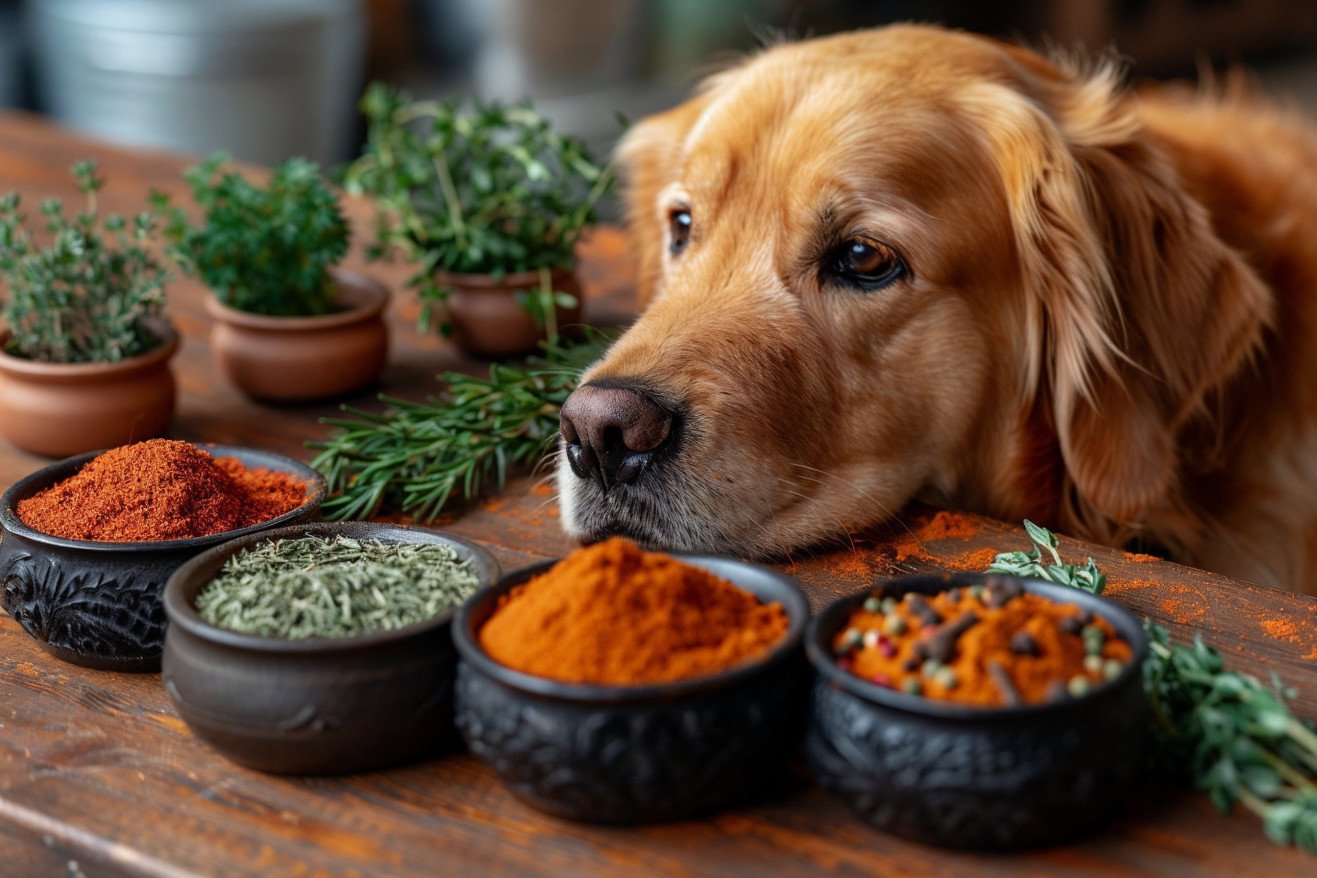Dog-Safe Spices: The Best Herbs and Spices to Use and Avoid
2 April 2024 • Updated 1 April 2024

When it comes to spicing up our pups' meals, it can be hard to figure out which spices and seasonings are safe for dogs to eat. Some of the most popular herbs and spices that are safe for dogs in moderation are basil, ginger, parsley, rosemary, and turmeric - however, others like garlic, nutmeg, and too much salt can be toxic.
We'll take a look at the most recent veterinary studies and expert opinions on the spices that are safe and unsafe for dogs, breaking down which herbs and spices are backed by science to be good for dogs and which ones pose a risk. In doing so, you'll learn how to make sure the meals you make for your dog are both delicious and nutritious, meeting your dog's dietary requirements while steering clear of any potential dangers.
What seasonings can dogs have?
Why Garlic and Onion Powder Are Bad for Dogs
Garlic and onion powder, along with other members of the Allium family including shallots and chives, are all poisonous to dogs and should be kept away from them at all costs. These spices contain thiosulfate, a compound that can cause oxidative damage to a dog's red blood cells, which can lead to hemolytic anemia, a condition that can be fatal.
The reason garlic and onions are toxic to dogs is because they can damage red blood cells and cause them to rupture, which can lead to a lack of oxygen in the body's organs. This can lead to organ failure and death in the most serious cases. Signs of garlic or onion poisoning include vomiting, diarrhea, lethargy, pale gums, rapid breathing, discolored urine, jaundice, and weakness.
Even small amounts of garlic and onion powder can be toxic, especially to small dogs or those with underlying health conditions. In fact, some breeds like the Akita and Shiba Inu seem to be especially susceptible to the toxic effects of garlic. While a large dog may have to eat more than 150 cloves of garlic to show signs of poisoning, a small amount could be enough to cause serious harm to a toy breed.
If you think your dog has eaten garlic, onion, or garlic or onion powder, it's important to get them to the vet immediately. Early intervention and supportive care are key because the longer you wait to get treatment, the more likely it is that your dog will experience complications like organ damage or failure. Make sure to keep Allium spices away from your dog because even a small amount can be dangerous.
The Dangers and Benefits of Black Pepper for Dogs
Although black pepper is not considered toxic to dogs, it can lead to gastrointestinal and respiratory issues if ingested in large amounts. The Native Pet notes that black pepper contains a chemical called piperine that can cause irritation to a dog's digestive tract, which can result in symptoms like sneezing, vomiting, and diarrhea.
That said, there are some potential benefits of black pepper when it's used in moderation. The Canine Nutritionist says that piperine can help improve a dog's ability to absorb nutrients, including selenium, vitamin B12, and curcumin, which is the active ingredient in turmeric and is known for its anti-inflammatory properties. In fact, studies have found that the combination of black pepper and turmeric can increase the bioavailability of curcumin by as much as 2,000%.
When adding black pepper to recipes for dogs, it's important to make sure you're using it in small amounts. MasterClass suggests using just a pinch or two, as even a small amount more can lead to digestive issues. It's also important to watch for signs of a negative reaction, including sneezing, vomiting, or diarrhea. If you notice any of these symptoms, it's important to stop feeding your dog black pepper and contact your vet.
Other Herbs and Spices That Are Safe for Dogs
In addition to the herbs and spices listed above, there are several other herbs and spices that can be used to season your dog's food. WagWalking lists other herbs and spices that are safe and healthy for dogs, including:
- Rosemary: Good for the heart and immune system, and has antibacterial properties.
- Parsley: Contains compounds that have anti-inflammatory effects that can help with arthritis, and has been shown to inhibit the growth of cancer cells.
- Dill: Helps with digestion and can relieve stomach upset, cramps, and gas. It can also help with bad breath.
- Cinnamon: Has anti-inflammatory properties that can help with joint pain and stiffness, especially in older dogs. It also improves circulation and lowers blood pressure.
- Ginger: Aids in digestion and can help with nausea and vomiting, and may even kill heartworm larvae in dogs that have been infected within the past few months.
- Turmeric: The active ingredient curcumin is an antioxidant with anti-inflammatory, wound-healing, and antimicrobial properties.
Dogster notes that these spices can be used in moderation in homemade dog treats and meals. However, it's important to talk to your vet or a veterinary nutritionist before adding any of these spices to your dog's diet in a significant way to make sure you're not throwing off the nutrient balance and to avoid any potential complications.
By experimenting with different safe spices, you can make your dog's food more interesting and potentially even improve their health without compromising their well-being. Just be sure to add these spices in moderation and with the help of your vet.
How to Make Sure Your Dog Gets Safe and Nutritious Food
It is important to talk to a vet or pet nutritionist before making any major changes to your dog's diet. Preventive Vet explains that there is not a lot of scientific evidence to support the use of herbs and spices for pets and that the FDA does not regulate supplements in the same way it does drugs. This means that adding seasonings or supplements to your dog's diet without professional help could result in nutrient deficiencies or other problems.
Of course, it's also important to make sure that your dog is getting a nutritious diet. Purina explains that even small amounts of certain foods like onions can be toxic to dogs and can cause anemia and other serious health problems, including death. This is why it's important to understand pet food labels and make sure that your dog is getting the right amounts of important nutrients.
No matter what changes you want to make to your dog's diet, it's important to make sure that you are always looking out for your dog's best interests. The Yahoo article stresses that you should always talk to your vet before giving your dog any herbs or spices because there is so little evidence about their impact on pets. By being careful and well-informed, you can make sure that your dog is as healthy and happy as possible.
Conclusion: Make Sure You're Prioritizing Your Dog's Health and Well-Being
The most important things to take away from this article are the need to be cautious when introducing new herbs and spices into a dog's diet. While basil, ginger, parsley, rosemary, and turmeric are generally safe for dogs in small amounts, garlic, onion, and too much black pepper can be dangerous.
It's important to avoid feeding dogs anything in the Allium family, including garlic and onions, as they contain compounds that can damage red blood cells and lead to life-threatening anemia. It's also important to use the safer herbs and spices in moderation, as too much of a good thing can lead to gastrointestinal upset or other problems.
Always make sure you're prioritizing your dog's health and well-being when you're thinking about making changes to their diet. It's always best to talk to a vet or a pet nutritionist before making any major changes to make sure you're getting the right balance of nutrients and to avoid any potential pitfalls. By being careful and informed, you can make sure that your dog stays happy, healthy, and well-fed.


